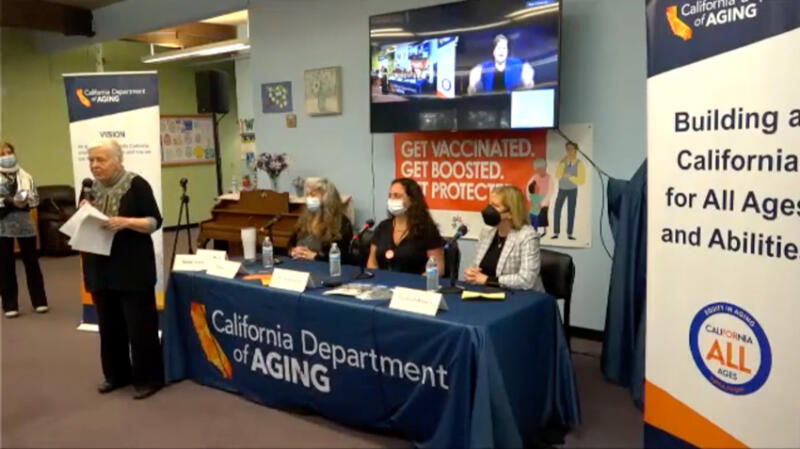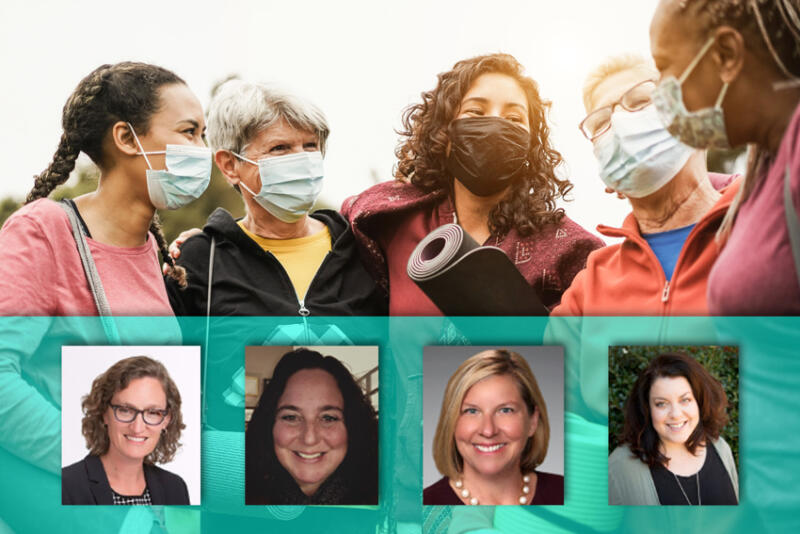Isolated By Pandemic, Vulnerable Older Adults Regain Social Life with Vaccines and Reopened Day Health Centers
(Above, Inset: l-r): Kim McCoy Wade, Sr. Advisor on Aging, Disability and Alzheimer’s, Office of the California Governor, Gavin Newsom; Dr. Sara Levin, Internist, Contra Costa Regional Medical Center; Susan DeMarois, Director, California Department of Aging; and Debbie Toth, President and CEO of Choice in Aging, also oversees Mt. Diablo Center. (Siliconeer/EMS)
Isolation turned out to be as dangerous as COVID-19 for many older adults and people with disabilities. With vaccines and boosters and most recently, the re-opening of adult day health centers, those most vulnerable to the virus can safely reconnect with their families and communities after two years.
Speakers shared their personal stories about how vaccines coupled with re-opening of adult day health centers allowed them to regain a social life.
Experts – Kim McCoy Wade, Sr. Advisor on Aging, Disability and Alzheimer’s, Office of the California Governor, Gavin Newsom; Dr. Sara Levin, Internist, Contra Costa Regional Medical Center; Susan DeMarois, Director, California Department of Aging; and Debbie Toth, President and CEO of Choice in Aging, also oversees Mt. Diablo Center – documented the impact of COVID-19 on the infection, hospitalization, and mortality rates as well as the mental health of older adults and people with disabilities. They also described the services administered by the California Department of Aging and other agencies to ensure that no members of vulnerable communities are left behind.

Welcoming all ethnic media colleagues who have joined in person, April 12, for this first on-site news briefing since March 12, 2020, and welcoming reporters from across California and the Bay Area who are joining over Zoom, Ethnic Media Services Director Sandy Close said “We’re honored today to partner with the California Department of Aging on this event and to host it at Choice in Aging, an innovative adult care center located in Pleasant Hill, in Contra Costa County, some 34 miles east of San Francisco.”
The focus was on the role of vaccines and adult care centers enabling older adults to break out of the isolation of the last two years and begin to rebuild a social life for themselves.
The briefing also highlighted a worrisome trend – a slowing down in getting vaccination rates and boosters among this population, one-third of people over 60 in the United States, 15 million older adults, are not fully vaccinated or boosted, which the former director of the CDC, Tom Frieden, called an issue of life and death with the resurgence possibly of BA.2, and the latest variants.
The briefing also described how isolation has proven to be almost as dangerous as COVID itself for older adults who now need to know how to access services like an adult care center to support their mental health and the first step of course is getting vaccinated and boosted.
Susan DeMarois, director of the Center for Aging began with “A big thank you to everyone who has brought us to this day, who has led over the last two years, the heroes – our local heroes; our county heroes; our state and federal heroes; individuals in government; individuals who provide direct services like Choice in Aging, boarding care partners, nursing homes, assisted living in hospitals, EMS providers, and our non-profit and community-based organization partners who have carried all of us, of all ages through this pandemic.”
“There are services and supports available in every county in our state so individuals of all ages and abilities can access information assistance and referrals locally in their own communities and there’s a very simple step to take. There is an 800 number (1-800-510-2020) and that’s where anyone can start at any time to be linked to the services and supports that they need.
“The second message in addition to services being available statewide in all 58 counties, is our network of aging and disability partners will meet individuals where they are. Many Californians have been fully vaccinated and boosted including some 50 and older who’ve received their second booster shot. It’s possible that those individuals are very eager to resume normal activities and we will meet them where they are and connect them to services and supports in their community, services like this adult day health care or adult day care services like senior centers, congregate meals, shared meals and dining, senior nutrition, so we will work where an individual is. We understand too that there are individuals who may be reluctant right now maybe they’re not yet fully vaccinated and boosted, or they have underlying health conditions that cause concern, we will work with individuals in those circumstances too and help provide services and supports virtually, if needed, link them to telephone and virtual supports and help educate on what is available to them in their community that they can access – services like the friendship line might be a possibility, and our efforts to close the digital divide where we’re working locally to provide technology devices access to broadband and data plans so that individuals can access can engage socially with technology.
“The third message – as the public health emergency concludes, we will be renewing Medi-Cal applications. It’s very important to communicate that anyone who is eligible for Medi-Cal that’s the Medicaid program in our state, that they update their contact information so that we have their current name, address, telephone, and email, on record, so that we can contact them to make sure they stay current with Medi-Cal when the public health emergency concludes. We don’t want anyone’s service eligibility or benefits to be disrupted in any way and that’s the important first step is to make sure that everyone is current with their contact information because people may have moved during the pandemic or their circumstances may have changed so we want to make sure that there’s maximum continuity of care for all Medi-Cal beneficiaries in our state
“In the coming months, individuals 50 and older who are undocumented will become eligible for Medi-Cal and will now have access to all the services and support that our state Medicaid program provides.
“The phone numbers to access information, the first was anyone in our state of any age can call 1-800-510-2020. The second number family caregiver resource centers is 1-800-445-8106.
Our friendship line, established during at the beginning of the pandemic, is available 24/7,” concluded DeMarios.
Dr Sarah Levin, an internist with Contra Costa Public Health spoke next. “We worked with our community, state, and federal partners, to try and mitigate, and reduce the deaths, and the suffering that occurred. As a public health department and as a health care system in this county, we were able to partner with organizations like Choice in Aging to do mobile clinics out to our 500 plus board and care homes, in partnership with the federal pharmacy partnership program, which was really facilitated by our state partners. We really pay attention and focus our resources and efforts on those that are most marginalized and vulnerable in our communities. The data um is constantly being updated on our dashboard at http://cchealth.org.”
“For someone who lives with your elderly parent or grandparent or someone who cannot easily get out of the house, we do have a place on our website cchealth.org where you can register and have a nurse come out to the home from our public health department to do boosters in the home,” said Dr Levin.
“There are some limitations, there are some interactions with other drugs so it becomes more complicated for people who have renal kidney disease or maybe on a lot of medications, but these are medications that we really want to get out to people. There are now test-to-treat pharmacies where you can present and get an antigen test, and if you’re positive, get the prescription right there on site for the five-day course of the anti-viral treatments.
If you’re feeling symptoms, it is best to go to a place where you can do tests to treat and not wait until it’s three, four days into the illness and you are already getting so sick that you need to go to the hospital to be cared for. There’s good evidence that those treatments can make the difference between having a mild cold illness and ending up in the intensive care unit on a ventilator,” said Dr. Levin.
Debbie Toth, director of Center for Aging, highlighted the incredible impact of adult day health care services provided for aging population, for adults with disabilities, and for anybody who wants to continue living in their home instead of an institution. “This last two years was unbelievably difficult, particularly for our aging population. The fear of death was real. Every day in the newspapers we were reading about older adults because we rarely read about older adults because they are so often invisible in our society. We were in a situation where they were dying and where they were getting ill at extremely high and scary rates and to add further damage, we were asking older adults to do what we told them all along never to do, which was to isolate.
We always tell older adults ‘Do not isolate, it will negatively impact your health’ but, to save lives, we told them they had to isolate and now we are dealing with trying to reconcile with what happened, because we, in order to save lives, had to do something that was counter to what is productive for our aging population. We need to socialize, we’re social creatures, we need to be able to have community, to come together, to share a language, a culture, a friendship, and vaccines and boosters are the only things that have made this possible for our aging population. We have to make sure that we’re providing the services and support that folks need, doing it in a very safe way, knowing that these are the folks who are most at risk of death and bad outcomes from this pandemic,” said Toth.
Kim McCoy Wade, Sr. Advisor on Aging, Disability and Alzheimer’s, Office of the California Governor, Gavin Newsom, who was formerly director of the California Department of Aging, shared her main concerns and hopes about older adults as they emerge from the isolation of the last two years. “We’ve had to be so focused on vaccines and boosters to save lives, but today we are focusing on vaccines and boosters to bring us back together, to reconnect, just as we’ve been talking about with children, the need to reopen schools, for so many reasons, and do so safely.
“What happens when we reopen our community centers, they have different names, Adult Day Health, and Choice in Aging, where Medicaid can help pay the cost.
“They’re all community centers where adults come together and we’re so thrilled that not just with vaccine and booster, but masking, distancing, testing, ventilation, treatment, all of those layers, are allowing people to come back together.
“The joy that comes from being together and the sadness, even depression, that can happen when you are isolated at home.
“If it’s one takeaway, it’s to keep current – keep it vaxxed, keep boosted, keep current – those of us who are 50 plus, make that plan today. Call your parents, call your grandparents, check on your neighbor, check on the person next to you at church. Do you have a plan to keep current and either that My Turn (https://myturn.gov) website is always a go-to including for transportation or coming to your home or your local public health department,” concluded McKoy Wade.


